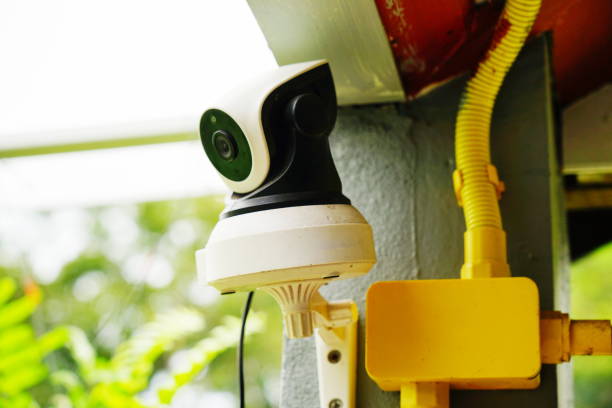
Security cameras are one of the most important inventions in technology. With
the increasing incidence of criminals and other gangs that are swarming around
the streets, CCTV cameras can be an excellent aid.
Although CCTV systems are more common in offices and shops, recent years have
seen an increase in home CCTV installations. Despite their popularity, people
are still seeking advice on how to set up CCTV cameras. However we suggest that
you do not attempt a DIY project. Although it is possible to install an entire
security camera system by yourself, it can be extremely long and time-consuming.
It is more likely that you will make mistakes when installing a CCTV system,
which could cause poor coverage, inadequate storage and poor control. This issue
can be solved by hiring a professional so you are assured that you have the best
setup for your needs.
You still need to be careful when hiring professionals to install your
security camera system. We have provided a list of the most basic important
things you need to consider while Alarm System Installation at home or at
work.
Coverage
It is important to identify which areas are the most vulnerable and need to
be covered. An analyst will be sent by the company that installs CCTV to help
you determine the ideal location to mount cameras to ensure optimal coverage.
You may also inform the technician know if there's a specific area that you want
the camera to cover.
Types of CCTV Cameras
The most popular wireless CCTV cameras of today are those that transmit
video. They eliminate the need to install wires. Additionally, they are easily
controlled. However, not all CCTV cameras work the same. A traditional camera
with a directional lens (also known as bullet cameras) is fixed and may only
point in only one direction. Dome cameras, which are commonly found in offices
of corporate clients and malls, can provide 360-degree coverage. Cameras must be
selected according to the type of coverage you need and the quality they
offer.
Localities
This is related to the topic of coverage we've already mentioned. It is
essential to take into consideration areas that could be vulnerable. This means
that you should use various types of cameras, based on their locations. If a
camera is placed outside of your garage's door will not be the same as an indoor
camera. This brings us to the second point: don't overlook the indoor coverage.
The criminals and thieves are becoming more adept at avoiding outdoor cameras
and even total area coverage can be defeated by masked burglars. The thieves
aren't expecting cameras in the indoor environment. A dome camera inside can
help you avoid a lot of problems later on.
Declaration and Legality
It's a lawful requirement that you inform the public that they are being
recorded. This is especially important for public areas like offices or shops. A
sign that says Alarm System
Installation are available would be sufficient. In the case of a home CCTV
installation You must inform any personnel who are visiting your house. You
should inform your household staff or other guests that you are planning to
watch them verbally if you wish to have CCTV installed within your home. A
further thing to keep in mind is that it's illegal to set up CCTV cameras inside
private areas such as bathrooms. You can go to jail for this kind of
crime.
Permissions
You might require permission from the authorities in question based on the
location you plan to install CCTV. Even when it is not required by law, it is an
act of goodwill. It is possible that you will need to cover the property of your
neighbors in the event that you install CCTV cameras in your shop or your house.
Inform them of this and adjust the angle if you feel uncomfortable. You must
inform your local civic society (e.g. RWA) before installation. Installation of
CCTV in apartments blocks is usually a requirement.
Technical Aspects
You'll need to figure out certain technical aspects about your security
system. Verify that your cameras can record HD video. Next, think about the
equipment you'll require. The majority of CCTV installations have storage and
recording hardware. A lot of them offer cloud storage that allows you to store
the recorded video online. Local storage is done using a hard disk just like on
a computer or laptop. The difference between the hard disk of a camera system
and the laptop's hard disk is that the camera in your hard disk is of larger
capacity and is capable of running continuously for a longer period. But, they
require replacement every now and then. Therefore, you should decide the
duration for which you would like to keep any video that is reordered. The
storage space you have available can be extended to keep the video for up to
three months, or even longer if there's enough. You should also consider the
remote access and control system. You can control and monitor the operation of
your CCTV camera from wherever you are.
These suggestions should answer your questions about how to install the CCTV
camera.
MaxSol Techs
0455 66 55 80
info@maxsol.com.au
Cranbourne, 3977 Victoria
Коментарі
Дописати коментар